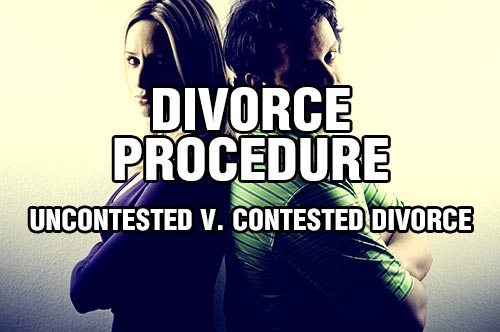So you and your spouse have agreed to negotiate your uncontested divorce, and now you’re ready to sit down and try to reach an agreement on the property division, support, and parenting issues. Great, so where do you start?
1. Try to negotiate
Don’t worry, it’s actually not that bad. Making decisions through the legal system should be a last resort. When a judge decides these issues for you, chances are good that both people will end up unhappy with the results. Most of these decisions can probably be made just by looking at your situation, trying to figure out your financial needs, and using a little common sense. If you’re still not ready to get past the anger you’re feeling, understand that it’s perfectly normal to feel that way.

You’ll need to allow yourself time to feel the anger and the sadness that you’ll inevitably face in this situation. But it’s not productive if you can’t get over these feelings. We highly recommend visiting Divorce as Friends, which provides a wealth of resources to help you resolve disputes without conflict and move on with your life.
Once you think you may be able to sit down with your spouse for more than 5 minutes without storming out, you should try the negotiations. First you should decide on the structure of your negotiations. Do you want to meet at home or in public? Try not to meet somewhere that will bring up a lot of relationship memories (the restaurant you went to for your first date would probably not be the best place), or the mood could quickly sour. If possible, you should keep your feelings separate from your finances. You can’t always do this, but if you want an uncontested divorce, you might have to compromise a little.
At the same time – and we emphasize this – don’t do anything you don’t feel comfortable with. Don’t give up any of your legal rights just to get your spouse off your back or to get your divorce over with. If you agree to something, it’s very difficult to change it later. Make sure you’ve thought about everything clearly before giving up any rights. If it begins to feel like you’re making too many compromises, and you don’t feel comfortable, you might need to see an attorney.
2. Define your goals
Just try to stick to the issues at hand while negotiating divorce. Make plans to allow yourselves to break if you start getting too emotional. Go take a walk, or just agree to meet another time. The starting point should be to define your goals. What is most important to you in negotiating your divorce? Do you want your children to be able to stay in the house at all costs? Do you need money now to get you back on your feet? You should make mental notes about what you really need, and decide what issues you can afford to give a little on.
During the mediation, these goals might change slightly. Maybe you find out it will cost you more than you expected to stay in the house, or your possessions don’t have as much cash value as you thought.
It’s still better to define your position before you start negotiating, then change that position as the situation changes, rather than going in without any goals at all.
If you reach an issue you can’t agree on, try to figure out why. Are you being unreasonable? Is anger or vengeance clouding your rational frame of mind? Demanding more than you need or are entitled to, just out of spite or for the sake of “winning,” will likely drag the divorce process out and cost more in legal bills. While it’s easy to blame your spouse, there are times when you might be able to admit to yourself that you could do more to cooperate.
Very rarely is anything ever completely one-sided. We’re all wrong sometimes. At the same time, maybe there’s something you could do to get your spouse to be more cooperative, if he or she is the one who’s being unreasonable. Often people spend more money fighting over a small piece of personal property than the property is even worth, just because one person can’t fully accept the divorce, or is being spiteful. If you’re going to spend more in legal fees than the item is worth, it’s probably not worth it. If you have kids, it’s especially important to develop good communication skills now so that you can prepare for the future when you will have to communicate quite a bit.
You might be able to negotiate your entire marital settlement agreement in just one or two sessions, or you might need several sessions to reach an agreement. Try to write as much down as possible after each mediation session, and review it. This way you can avoid most discrepancies that could later arise. You may decide to give yourselves some time, such as 48 hours, to independently review the agreement before having the divorce papers prepared. This way you still have time to change your mind if you decide something is unfair.
3. Mediate with a professional mediator
If there are still issues you can’t agree on after trying to work an agreement out yourselves, you can still try other things before fully retaining an attorney. Try mediating with a professional mediator. You’ll use similar techniques with the mediator as you’ve used on your own while negotiating, but you’ll now have an impartial third person to guide you. This person is trained in conflict resolution, and can often help you reach a reasonable, fair compromise. Some mediators are also attorneys who can explain the law to you, although most mediators aren’t able to give legal advice, because they can’t represent either party. A mediator is simply a neutral third person who’s experienced and well trained in negotiating and compromise.
There are many advantages to using mediation, either amongst yourselves or with the help of a professional mediator.
- Using mediation instead of litigation is less adversarial. With less of a “battle,” you’ll probably end up feeling less stress.
- When people negotiate their own marital settlement agreement, instead of letting a court order it, they’re more likely to stand by the agreement. Your spouse will be more likely to pay spousal or child support if he or she takes part in creating the agreement. Research has also shown that parents who are more involved in their children’s lives are more likely to pay child support regularly. By encouraging your spouse to play an active role in your children’s lives, and by coming up with the terms of your parenting agreement together, everyone wins. Your children do better with two loving parents, and you’re more likely to regularly receive child support if the other parent is actively involved.
- Mediation is usually less expensive than litigation. A contested divorce could literally rack up tens of thousands of dollars in legal fees, and then you have to make sure your spouse follows through with the agreement. Since people are less likely to follow the terms of an agreement when a court orders it than they are if they negotiate an agreement together, you’ll probably end up in court more often, trying to get the court to enforce the agreement. That means more legal bills following the divorce. On the other hand, when you negotiate your own settlement, you need to consult with an attorney and other professionals only when you need them. Getting limited legal advice or using a mediator will almost always be less expensive than retaining an attorney.
- Using mediation is more flexible than the legal system. Judges are bound by laws and “stare decisis.” Stare decisis means judges must follow the lead of cases that have been decided before yours when there are similar circumstances. For example, the court may have a standard visitation schedule they have to use unless you and your spouse can agree to your own visitation schedule. There are only limited factors a judge can consider. Even if an alternative option might make perfect sense to you, a judge might be limited in being able to make an order. Also keep in mind that a judge will only see you for a few minutes or hours of your life, and they’re usually seeing the worst side of each of you. You and your spouse know your finances and your children better than anyone, and therefore you, and not a court, are almost always the best judges of what is best in your situation.
- Mediation allows you much more control over your own case. You’ll improve your communication skills with your spouse, and hopefully make the process go more smoothly. You may learn a little about the legal system along the way and feel more empowered by what you could do on your own!
So how do you find a mediator?
- Yellow pages of your phone book
- Referral from a Bar association or your attorney
- Referral from friends and family/word of mouth
- Therapist
- Newspaper/advertisement
- Online search
- Local government or courthouse
If you decide you need an attorney, either to help you during your negotiations or represent you in court, to be there with you during mediation, to seek advice from, or to look over your agreement; you can get referrals from the same places listed above, as well as from your county, state, or national Bar association.









